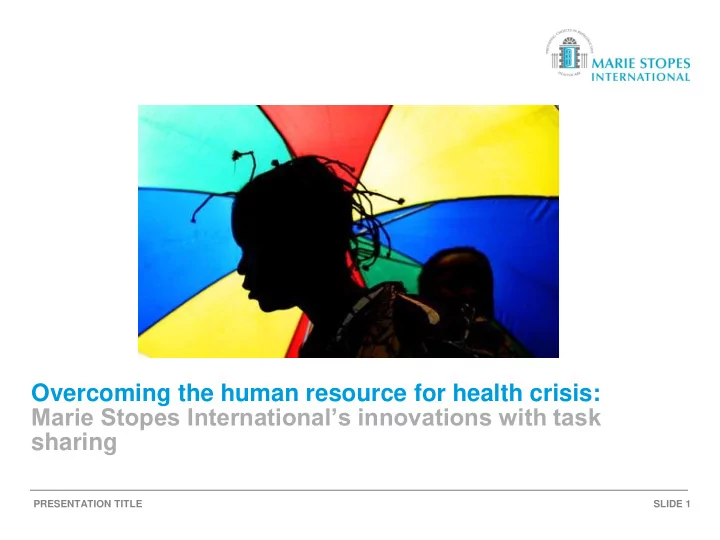

Overcoming the human resource for health crisis: Marie Stopes International’s innovations with task sharing PRESENTATION TITLE SLIDE 1
Objectives Human resource for health crisis Mid-level providers as a solution MSI task sharing overview MSI’s contributions to the evidence -base PRESENTATION TITLE SLIDE 2
Human resource crisis Physicians per 100,000 3.5 3 population 2.5 2 1.5 1 0.5 0 h n a a e a a K A a m n a a e a a i w i a s a y d t n n i S y i i i l U d s b n a a n p a b t e t n a o a U n s o s e m o r d e l i a h e t L i i a z t b n L i s k a K G h e g a M L n u a m a i l U r t Z a V g o E a A P h a n T m r g C r a f e A i B T i S PRESENTATION TITLE SLIDE 3
Mid-level providers Mid-level providers are health workers with 2-3 years of post- secondary school healthcare training who undertake tasks usually carried out by doctors and nurses, such as clinical or diagnostic functions. Varying length of training Varying levels of clinical skills Mid-level providers offer an important solution to filling the human resource for health crisis in reproductive health care – particularly LAPM PRESENTATION TITLE SLIDE 4
MSI Recommendations Method Physician Non- Midwife Nurse Community (Doctor) Physician Health Clinician Worker BTL Vasectomy IUD Implant Injectable Condoms/ Pills PRESENTATION TITLE SLIDE 5
Mid-level providers come in different shapes and sizes Country Job Title Training Ethiopia Health Extension Worker 1 year Ghana Community Health Officer 2 years Zambia Medical Licentiate 5 years India Auxiliary Nurse Midwife 18 months Pakistan Lady Health Worker 15 months PRESENTATION TITLE SLIDE 6
MSI programmes implementing LAPM recommendations PRESENTATION TITLE SLIDE 7
Approach to task sharing Task-sharing is principally a policy issue Scaling-up task sharing can only take place once an enabling policy framework has been established MSI have developed a standard framework for enabling task sharing Analyse Estimate Develop Implement Support Develop existing Map policy- the policy engagement protocol and quality clinical making impact engagement action plan curriculum assurance regulations environment of task action plan (inc piloting) development strategy and sharing training PRESENTATION TITLE SLIDE 8
Task sharing across MSI South Uganda Sudan Zambia Ethiopia Timor Malawi Leste PRESENTATION TITLE SLIDE 9
Developing the evidence-base Tubal ligation 83% of Malawi’s tubal ligation services are performed by non-physicians on outreach Clinical audit followed-up all clients at 3, 7, 14 and 30 days post procedure 3% of women experienced mild complications – e.g. mild infection, bleeding or poor healing. No major complications were identified On average women reported that they could return to normal activities and work after 5.5 days PRESENTATION TITLE SLIDE 10
Developing the evidence-base Tubal ligation Uganda TL task-sharing is in line with the current Uganda Health Sector Strategic Plan to ensure constant supply of adequate, relevant, well mixed and competent community focused health workforce. Opportunity for MSU to provide evidence to advocate for policy change to enable wider access and provision of FP options in Uganda Uganda – MSI are currently collecting data in a prospective cohort study PRESENTATION TITLE SLIDE 11
Summary Task sharing is an effective solution to addressing a skills imbalance in health systems Sharing family planning provision between physicians and clinical staff, midwives and community workers can help expand access to health delivery whilst allowing physicians to focus on more complex clinical tasks. Moving traditionally medicalised LAPM roles to mid-level workers can be successful when it involves a narrower range of services rather than more generalised tasks. We’re collecting an evidence -base. Can you help? PRESENTATION TITLE SLIDE 12
Thank you PRESENTATION TITLE SLIDE 13
Recommend
More recommend